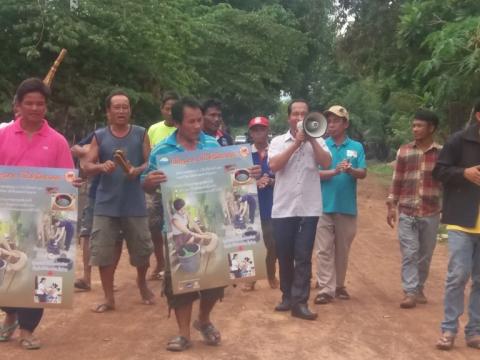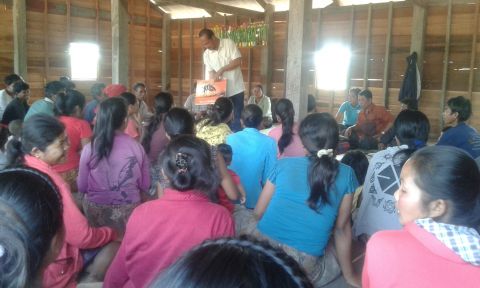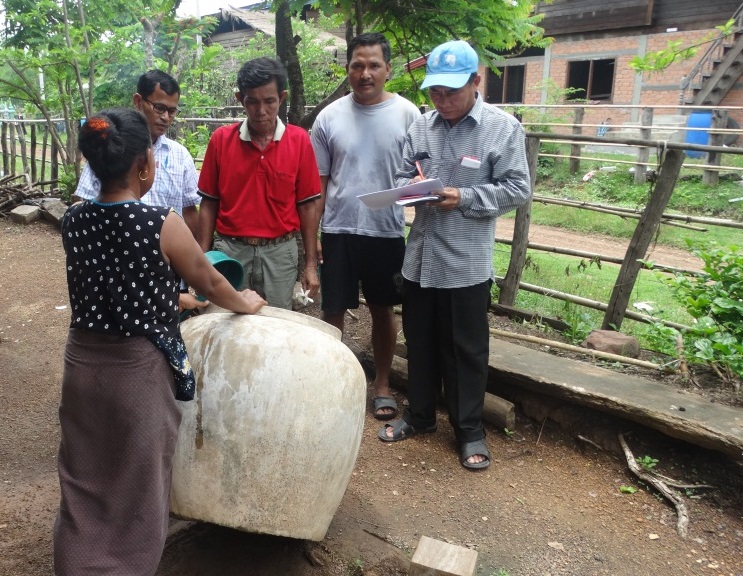World Vision responds to Dengue outbreak in Soukhouma

A mobile team is responding to the dengue outbreak in Soukhouma district, Champasack Province, by going to 62 villages to monitor and destroy mosquito habitat, carrying out a dengue prevention awareness raising campaign, and encouraging the community to report suspected cases.
The team, supported by World Vision, is working closely with Soukhouma district health and other development partners, to monitor and respond to the outbreak.
To encourage community participation, village volunteers were trained and used traditional instruments to play a song about dengue fever. The song is broadcasted from a car that drives through the village.
“It is a good campaign that is able to draw our attention while we are doing housework,” says Phetsamone, mother of three children.
“This is the highest outbreak reported in the past five years. The number of cases reported reached 510, which is seven times higher than last year. Three of them were deaths,” says Dr. Khamla Souphavady, Chief Division of Epidemiology and Information Center of Soukhouma District Health Office.
“With support from the Ministry of Health and development partners including WHO, UNICEF and World Vision, we are able to have surveillance and response teams standing by at the cluster health care center,” adds Dr. Khamla.
The team includes sub-teams that look after treatment, epidemiology, and health information and education.The surveillance and response team works closely with village health volunteer to visit every household. They provide information; destroy mosquito breeding grounds, as well as having a water clean-up campaign that aims to mobilize people to clear stagnant pools of water, which are primary breeding grounds for mosquitoes.
With support from the Ministry of Health and development partners including World Vision, we are able to have surveillance and response teams standing by at the cluster health care center.
In the 15 villages where World Vision works in the area, the team was able to reach 742 households so far.
“We are providing information of to the family, destroying mosquito ecology and support any suspected cases that goes for the treatment,” says Souphanavanh Luangsongka, World Vision Area Development Health Coordinator, who works closely with district and community health volunteers.

Dengue fever is a mosquito-borne disease that occurs in tropical and subtropical areas of the world. Mild dengue fever causes high fever, rash, and muscle and joint pain. The early symptoms of dengue fever are headache, vomiting and fever, which can easily be confused with those of flu or gastroenteritis. This makes it difficult to recognize it in the first few days, hampering the chances of early treatment.
Severe dengue is a leading cause of death among children, but early detection and access to proper medical care can help prevent complications.There is no vaccine or specific drug treatment for dengue fever.
The Government is running a series of awareness campaigns, including a weekly water clean-up campaign that aims to mobilize people to clear stagnant pools of water to prevent mosquitoes from breeding.
“This is not easy,” Dr. Khamla added. “We need the whole community participation: every family, every household should actively join to destroy mosquito habitat, the primary breeding grounds for mosquitoes and clear stagnant pools of water.”
